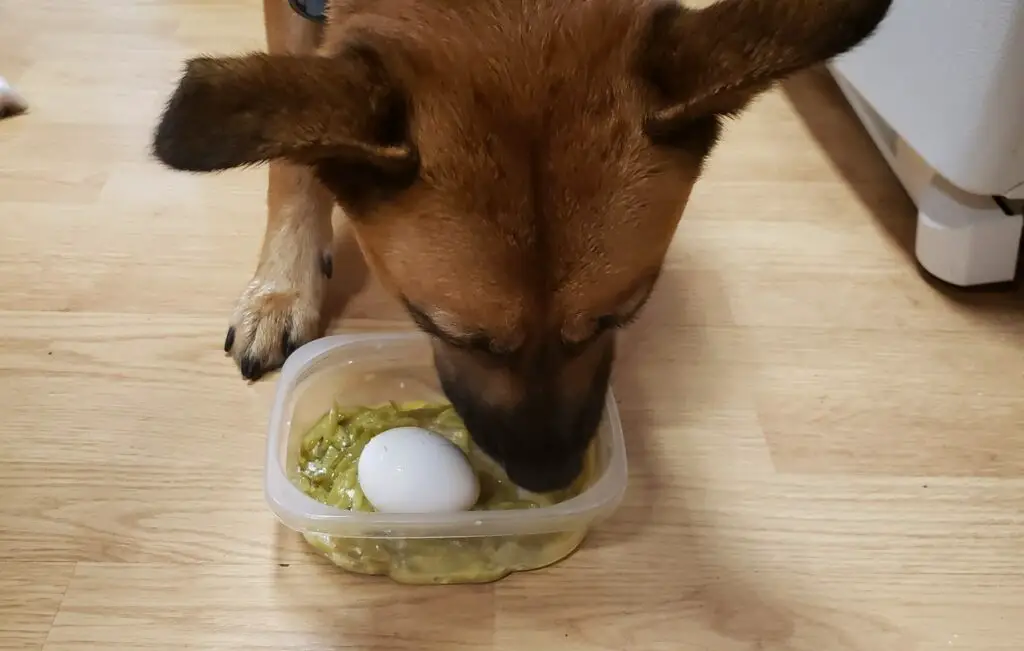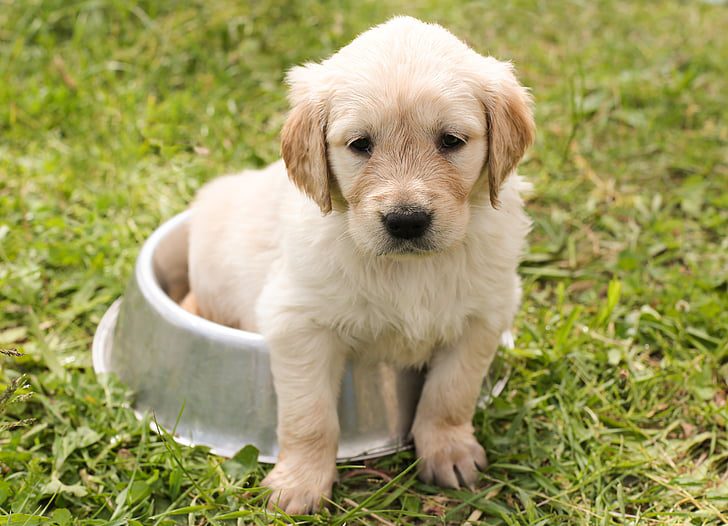Eggs are a type of food that humans consume almost every day.
But when it comes to puppies eating eggs, it is a bit different.
Read on to find out when can puppies start to eat eggs safely.
Puppies can start eating eggs once they transition to solid foods, typically around 7-10 weeks of age, but it’s essential to ensure they are cooked thoroughly to avoid any health risks.
At What Age Can Puppies Eat Eggs?

Puppies can safely eat cooked eggs from the age of 14 weeks without the risk of getting diarrhea. Feeding your puppy eggs before the age of 14 weeks is almost guaranteed to cause diarrhea and gastrointestinal upset.
To be safe, wait until your puppy is at least 14 weeks old before introducing them to cooked eggs. Make sure that the egg has been adequately cooked (hard-boiled or scrambled) and cooled before serving it to your pup.
Feeding your puppy cooked eggs provides a great source of protein and other essential vitamins and minerals.
When feeding your pup cooked eggs, keep in mind that they should not be fed more than one per day; too much protein can cause gastrointestinal upset and weight gain in puppies.
Dr. Sara Ochoa a veterinarian and the co-founder of How To Pets say that puppies shouldn’t be fed raw eggs until they reach adulthood.
Raw egg whites contain an enzyme called avidin that inhibits biotin absorption. Additionally, raw eggs may also contain salmonella which can cause gastrointestinal illness in puppies.
Therefore, it’s best to feed your puppy cooked eggs such as hard-boiled or scrambled with no salt or butter added. It’s always a good idea to introduce new foods gradually and monitor your puppy. Look for any signs of digestive upset before feeding them anything new.
What Nutrients Do Eggs Provide for Puppies?

| Nutrient | Benefit for Puppies |
|---|---|
| Protein | Essential for growth and development, muscle building, and repairing body tissues. |
| Fat | Provides energy, helps in brain development, and keeps the skin and hair coat healthy. |
| Vitamin A | Important for vision, immune function, and cell growth. |
| Vitamin B12 | Crucial for brain function and the formation of red blood cells. |
| Riboflavin (Vitamin B2) | Needed for energy production and cellular function. |
| Folate (Vitamin B9) | Necessary for DNA synthesis and cell growth. |
| Iron | Helps carry oxygen in the blood to all cells and muscles to prevent anemia. |
| Selenium | Works as an antioxidant, protecting the body from damage by free radicals. |
Types of Eggs Safe For Puppies

Safe types of eggs for puppies include those from chickens, ducks, and quails, provided they are cooked thoroughly, such as by boiling or scrambling.
Chicken Eggs
Chicken eggs are the most common type of egg available and are perfectly safe for puppies when cooked thoroughly.
They’re rich in protein and contain essential vitamins and minerals that can contribute to a puppy’s healthy growth and development. As a veterinarian, I often tell dog owners that chicken eggs can be a great supplement to a balanced diet, but they should not replace regular meals.
Duck Eggs
Duck eggs are larger and have a higher fat content than chicken eggs, which can make them a good source of energy for your puppy.
However, due to their higher fat content, it’s especially important to monitor portion sizes to prevent overfeeding. I’ve seen cases where puppies have gained excess weight due to overfeeding of high-fat foods like duck eggs says AKC.
Quail Eggs
Quail eggs are much smaller than chicken or duck eggs but pack a nutritional punch. They’re safe for puppies when cooked and can be a novel addition to their diet.
Given their size, quail eggs can be particularly useful for smaller breeds or young puppies.
Scrambled Eggs
Scrambled eggs can be a safe and tasty treat for your puppy. Just remember to cook them thoroughly and avoid adding any salt, pepper, or other seasonings that could upset your puppy’s stomach says PetMD.
Boiled Eggs
Boiled eggs are another safe option for puppies. They’re easy to prepare and can be cut into small pieces for easy consumption.
How to Safely Feed Eggs to Your Puppy

Safely feeding eggs to your puppy involves cooking the eggs thoroughly, monitoring portion sizes, and ensuring it complements a balanced diet.
Cook Eggs Thoroughly
The safest way to feed eggs to your puppy is by cooking them completely. This could be hard-boiling them or scrambling them without any added salt or seasonings.
Cooking the eggs not only makes them easier to digest but also eliminates the risk of salmonella contamination, which can cause serious health issues in puppies.
Monitor Portion Sizes
While eggs are nutritionally dense, providing your puppy with valuable protein and essential vitamins, they should not constitute the bulk of your puppy’s diet.
As a rule of thumb, most dogs should not consume more than one full egg per day. For smaller puppies, even half an egg may be sufficient. Overfeeding eggs can lead to obesity and other health issues as per AustralianEggs.
Eggs as a Complement to a Balanced Diet
Eggs should serve as a supplement to your puppy’s diet and not replace their regular meals. A puppy’s diet should be balanced and complete, providing all the necessary nutrients they need for growth and development.
During my veterinary practice, I have encountered cases where puppies were fed an unbalanced diet, leading to nutritional deficiencies and health problems.
One such case involved a puppy that was fed primarily eggs, resulting in an imbalanced nutrient intake. After advising the owner to reduce the egg portion and incorporate a variety of other foods, the puppy’s health improved significantly.
Can I Put An Egg In My Puppy Food?

Yes. You can add a cooked egg to your puppy’s food. If your puppy’s food does not contain egg, then adding an egg is generally safe as long as it is cooked thoroughly and cooled before serving it to your pup.
Eggs provide a good source of protein and also help keep stools firm. However, if you decide to add eggs to your pup’s diet, make sure that you only give them occasionally. That way your pup doesn’t become too reliant on them for nutrition.
Cooked eggs can be a great source of protein and other essential nutrients for small puppies. Eggs contain high levels of amino acids, which are important for building muscles and repairing tissue damage.
They are also rich in vitamins A, B12, D, and E, as well as minerals like zinc, iron, and phosphorus. Cooked eggs provide all the nutrition small puppies need to grow healthy and strong.
Additionally, cooked eggs are easy to digest so they put less strain on puppy tummies than raw eggs do. Puppies that have sensitive stomachs can benefit from having cooked egg dishes in their diets, as it reduces the risk of digestive issues or food allergies.
(See also: Can I Give My Dog Raw Egg Every Day? Know This First)
How Many Times a Week Can a Puppy Eat Eggs?

Puppies can eat one cooked egg every day. Too many eggs can cause an imbalance in their nutrient intake, resulting in health issues such as obesity and digestive problems. Feeding raw eggs to puppies should also be done with caution as they are susceptible to salmonella poisoning.
Eggs can be a healthy part of your puppy’s diet, but should not be given more than once a day. It is best to consult with your veterinarian before introducing eggs into your puppy’s diet.
When feeding eggs to puppies, it is important to make sure that the egg yolks and whites are fully cooked and mixed together thoroughly before feeding.
Raw egg whites contain avidin which blocks the absorption of biotin (vitamin B7), leading to deficiencies over time if not balanced with adequate amounts of biotin-rich foods.
Generally speaking, puppies can safely consume eggs up to once a day. However, if you are feeding your pup a high-protein diet or using egg whites as an ingredient in homemade dog treats, then it’s best to limit their intake to once per week or less.
If you notice any adverse reactions such as digestive upset or an increase in stool volume after feeding eggs, discontinue use and consult with your veterinarian for further advice as per The Wildest.
Benefits Of Feeding Eggs To Puppies

Eggs are a great source of nutrition for puppies and can provide several benefits that support their growth and development. Here are some of the benefits of feeding eggs to puppies:
High in Protein
Eggs are a rich source of protein, which is essential for building and repairing tissues in the body. Protein also helps support the immune system and provides energy. Puppies need protein to support their growth and development, and eggs can be a good source of this important nutrient.
Essential Amino and Fatty Acids
Along with protein, eggs contain essential amino acids that are necessary for proper growth and development. These amino acids cannot be produced by the body and must be obtained through diet. Eggs also contain healthy fats that provide energy and support brain development.
Vitamins and Minerals
Eggs are packed with vitamins and minerals that can benefit a puppy’s health. For example, they are a good source of vitamin A, which supports vision and skin health.
They also contain vitamin B12, which is important for red blood cell formation and nervous system function. Additionally, eggs contain folate, iron, and other minerals that help support overall health as per WebMD.
Helps Maintain Skin and Coat Health
The nutrients found in eggs, such as protein and healthy fats, can help support the health of a puppy’s skin and coat. This can lead to shinier, healthier-looking fur and less dryness or flakiness.
Moderation is Key
While eggs can provide several benefits for puppies, it is important to remember that moderation is key. Too much of any one food can upset a puppy’s stomach and cause digestive issues.
Additionally, raw eggs can potentially contain harmful bacteria like salmonella, so it’s best to cook them before feeding them to your puppy says Purina.
(See also: Can Dogs Eat Eggshells? Yes, They Can)
Are Eggs Necessary for Growing Puppies?

While eggs are beneficial for puppies due to their rich nutrient content, they are not necessary as long as the puppy is receiving a balanced and complete diet.
Eggs are a fantastic source of protein, vitamins, and minerals that can contribute positively to a puppy’s growth and development.
They can provide a nice supplement to your puppy’s diet, especially if they’re cooked well to eliminate any risk of salmonella.
That being said, they aren’t a mandatory part of a puppy’s diet. If your puppy is already receiving a balanced and complete diet, which should include good quality puppy food, they are getting all the necessary nutrients they need for their growth and development.
From my perspective as a veterinarian, I’ve seen dog owners use eggs as a healthy treat or supplement, but it’s important to note that over-reliance on any single food item is not advisable.
Can I Give Egg Yolk To My Puppy?
Yes, puppies can eat one cooked egg yolk per day. Egg yolk can be a nutritious addition to your puppy’s diet, providing them with high-quality protein and essential fatty acids.
However, egg yolks should only be given to puppies in moderation, and no more than one per day. Too much of it can lead to digestive issues due to the high-fat content in egg yolks.
If you are going to offer your puppy egg yolks, make sure they’re cooked thoroughly and not raw, as this could potentially cause food-borne illnesses or parasites.
Egg whites should also be avoided as they contain an enzyme that can block the absorption of biotin which is important for healthy skin, coat, and nerves. You should always consult your veterinarian before adding any new foods or treats to your pup’s diet.
To make egg yolk for your pup, you will need one large egg (preferably organic). Separate the egg whites from the yolk using a spoon or other utensil. Place the egg yolk in a small bowl or on a plate and mash it up with a fork until it is smooth and creamy.
If desired, you may add some warm water to help make it easier to mash. Serve the mashed egg yolk as is, or mix it into other foods such as cooked oatmeal, boiled potatoes, or kibble.
What Part of The Egg Do You Give a Puppy?

Puppies can consume both the egg white and yolk, but it’s recommended to cook these first to avoid potential health risks, and eggshells must be finely ground to prevent choking.
Both the egg white and the yolk are nutritious parts that you can include in your puppy’s diet. The egg white is a great source of protein, and the yolk is rich in vitamins and healthy fats.
However, to eliminate the risk of salmonella contamination, it’s crucial to cook the eggs thoroughly before feeding them to your puppy.
On the topic of eggshells, they are indeed a good source of calcium, which is beneficial for a puppy’s bone health. However, care must be taken if you decide to feed your puppy eggshells.
They should be boiled to kill any bacteria, then dried and finely ground to a powder to prevent any choking hazards.
In my years of veterinary practice, I have advised many dog owners about the benefits and precautions of feeding eggs to their pets.
It’s always important to introduce any new food gradually and observe your puppy for any adverse reactions.
Potential Risks and Precautions When Feeding Eggs To Puppies
Feeding eggs to puppies comes with potential risks and precautions, including the risk of salmonella from raw eggs, overfeeding leading to obesity, and the possibility of biotin deficiency.
Risk of Salmonella
One of the primary risks when feeding eggs to puppies is the potential for salmonella contamination. This bacteria can be present in raw eggs and cause an infection known as Salmonellosis.
To mitigate this risk, it’s advisable to thoroughly cook the eggs before giving them to your puppy. Cooking not only eliminates the risk of salmonella but also makes the egg easier for your puppy to digest.
There is a case study done on mechanisms of egg contamination by Salmonella by Oxford Microbiology.
Overfeeding Can Lead to Obesity
Eggs are high in protein and fat, which while beneficial in appropriate amounts, can lead to obesity if overfed. It’s important to remember that eggs should supplement your puppy’s diet, not replace their regular meals.
Over my years in practice, I’ve advised many pet owners about portion control and the importance of a balanced diet. Too much of anything, including eggs, can be harmful.
Possibility of Biotin Deficiency
Although less common, there’s a risk of biotin deficiency when feeding raw eggs to puppies. Raw egg whites contain avidin, a protein that binds to biotin (a B vitamin) and prevents its absorption.
Cooking the egg deactivates avidin, allowing for proper biotin absorption. This is another reason why cooked eggs are preferable.
Biotin deficiency is a huge problem, as per this case study.
Potential Dehydration from Salt
Some people may want to add flavor to the eggs by adding salt. However, too much salt can lead to dehydration in dogs. Always cook eggs without any added salt or seasoning.
Digestive Issues from Dairy Products
If you’re considering making scrambled eggs for your puppy, remember that many dogs can’t digest dairy products well. Ingredients like milk or cheese could lead to an upset stomach.
FAQs
Q: Can dogs eat raw eggs?
A: Yes, dogs can eat raw eggs. However, it is important to note that raw eggs may increase the risk of Salmonella or E. coli infection.
Q: Are eggs good for dogs?
A: Yes, eggs are a great source of protein and contain valuable nutrients such as vitamins and minerals.
Q: How many eggs can a dog eat?
A: It is generally safe to feed your dog one egg per day. However, it is recommended to consult with your veterinarian to determine the appropriate amount based on your dog’s size, breed, and overall health.
Q: Can you scramble eggs for dogs?
A: Yes, you can scramble eggs for your dog. Just make sure not to add any seasonings or ingredients that may be harmful to dogs.
Q: Are eggs safe for dogs?
A: Yes, eggs are generally safe for dogs to eat. However, it is recommended to cook the eggs thoroughly to reduce the risk of bacterial contamination.
In Conclusion
Puppies can safely eat cooked eggs from the age of 14 weeks. Feeding your puppy eggs before that age can lead to diarrhea. As far as raw eggs, it is not advisable to feed your young puppy because of the risk of salmonella.





Leave a Reply